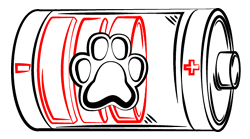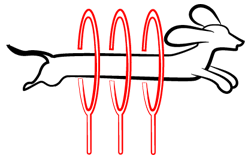
Paws ‘N’ Pups Quickview
Size
| Energy Level
| Trainability
| Paws ‘N’ Pups Rank
|
Characteristics
| Physical Characteristics: Height: 7-10” Weight: 6-10 lbs. Energy Level: Moderate – High | Colors: The Pinny-Poo is found in the following colors:
|
Health & Longevity
Average Life Span: 10-15 years
The Pinny-Poo, a crossbreed between a Miniature Pinscher and a Toy Poodle, is a sensitive pup with a few minor and major health issues. Thankfully though, most of these health issues are age-related, and do not become prominent concerns until the pup is between 7-8 years of age. While the Miniature Pinscher is generally a healthy parent breed, the Toy Poodle plays host to several health issues. Most of which are inherited through generations of crossbreeding to create both a Toy Poodle and a Pinny-Poo.
With some breeds, you can crossbreed them multiple times to get a healthier pup than the parents. The same cannot be said for the Pinny-Poo. These pups, while sweet and adoring, are plagued by health issues in their old age. Luckily, you can ensure a long and healthy life for your Pinny-Poo with regular vet check-ups, a nutritious diet, and plenty of exercise.
Some of the health issues that your Pinny-Poo could face include:
Von Willebrand’s Disease
This condition, caused by lack of clotting proteins in the blood, results in scary symptoms, like excessive bleeding from the mouth, nose, anus, and genitals. While pups with this condition rarely bleed out, there is still a risk of this disease becoming fatal. It can affect a Pinny-Poo for a few years, or it could be a lifelong ailment that requires consistent care. Numerous blood transfusions and surgeries are in the future for a dog with this condition.
Joint Dysplasia
This developmental condition occurs when the hip or elbow joints are forming. Instead of a smooth joint, it could be malformed, causing it to slip out of the socket. In severe cases, joint dysplasia can result in cartilage deterioration and painful arthritis. Surgery is the only way to correct this condition.
Minor health issues that your Pinny-Poo might develop include skin allergies, cherry eyes, patellar luxation, hypothyroidism, and epilepsy. On average, despite both major and minor health issues that could occur, the Pinny-Poo has a lifespan of 10-15 years.
Temperament & Train-ability
Energetic and loveable, the Pinny-Poo is a sweet pup with an affectionate nature. She loves being social with everyone, including other small dogs and children. However, she may have a problem with bigger dogs. These crossbreeds have a tendency to think they’re bigger than they are, so naturally, they want to be dominant when it comes to other pups. Socialize and train her from an early age to eliminate her chances of challenging a big dog.
While the Pinny-Poo is adorable and sweet, she also has a stubborn streak that comes from both of her parent breeds. Poodles are naturally independent, and Miniature Pinschers are strong-willed. When combined in the Pinny-Poo, the stubbornness and hard-headedness could temporarily get in the way of proper training.
Luckily, the Pinny-Poo is an excellent listener and fast learner. To train her, establish yourself as alpha of the pack. Use a clear, firm voice to issue commands, and reward her with treats and encouragement for obedience. When she sees you as the leader, training will be much easier because she has an innate eager-to-please attitude.
Exercise-wise, the Pinny-Poo is a giddy, bouncy pup, but her stature causes her to get tired quickly. She uses up most of her energy within minutes of running and playing outside. However, be careful when you take her off her leash in public places. She is a very fast runner and will bolt if she’s not properly trained to stay put. She also loves to jump really high, so your backyard should have a high fence to prevent escape.
Grooming
Since Poodles are hypoallergenic, there is a 50/50 chance that your Pinny-Poo will be hypoallergenic as well. These pups are low-shedding regardless of which parent breed coat they inherit. Brush your Pinny-Poo three times a week with a soft, fine-bristled brush. Bathe her up to two times a month with gentle dog shampoo.
Pinny-Poos are prone to ear infections, so check her ears once a week for redness, clear fluids, or a foul odor. Use a cotton swab and a vet-recommended cleaning solution to clear debris and wax from the rim of her ears. Never, ever stick anything into a dog’s ear canal.
Diet
Pinny-Poos should have two meals per day of ½ cup dry kibble each time. She is very high energy which means she has a voracious, healthy appetite. One that should be fed with wholesome, nutritious dry dog food, rich in protein, good fats, and fiber.
Ask your vet which dog food they would recommend for your Pinny-Poo. It absolutely matters what you put into her body, as by-products and fillers could be detrimental to any dog’s health. Nutritious kibble might not be the cheapest food, but it certainly goes a long way towards ensuring your Pinny-Poo lives a long, healthy life.
Looking for a Pinny-Poo?
 Find A Pinny-Poo Breeder |  Pinny-Poo Puppies For Sale |  Adopt A Pinny-Poo |
Cost
Luckily, Pinny-Poos are in abundance, so it should be easy for you to find your perfect companion at either a local animal shelter or a breeder. If you go the animal shelter route, adoption fees run between $100 to $150. If you choose to buy from a breeder, expect to pay between $200 to $650 for a Pinny-Poo puppy.
Aside from the cost of buying or adopting a Pinny-Poo, you should also consider additional expenses. Toys, nutritious dog food, routine vet visits, vaccinations, and flea treatments are the tip of the proverbial iceberg. Make sure you can cover all of your pup’s needs for the foreseeable future. Dogs are a long-term commitment after all.
Paws ‘N’ Pups Ranking
Paws ‘N’ Pups ranks every breed out of 4 with 1 being easiest to integrate into your life and 4 being the toughest – The lower the ranking the better.
Ranking takes into account a few basic factors including cost, skill level needed, high vs low maintenance and how critical regular training is to success. The Pinny-Poo ranks a 1.5 on the integration scale. She is a sweetheart with an affectionate side that shines through most when she follows you around the house. Her love for her family is boundless, so expect lots of snuggles from your new pup. While she may be jealous of or stand-offish towards other dogs, especially big dogs, this trait can easily be trained out of her with socialization in the puppy stage.
Breeds Similar To Pinny-Poo
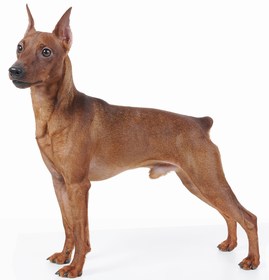 Miniature Pinscher | 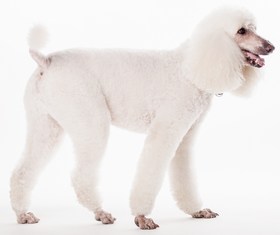 Toy Poodle | 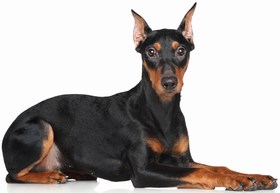 German Pinscher | 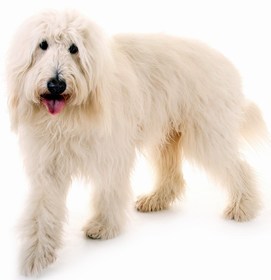 Toy Goldendoodle |


